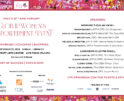
Thankful for Sources of Power, 3 of 5
Let’s continue to explore the five sources of power by Joann M. Eisenhart, Ph.D., Senior Vice President for Human resources, Facilities and Philanthropy at Northwestern Mutual, who studied the topic in her doctoral dissertation, The Meaning and Use of Power among Female Corporate Leaders.
Power Source No. 3: Relationships
Key to Success: Don’t overdraw the emotional bank account in your professional relationships.
Women judge themselves to be highly successful in building relationships. Nearly half of the women interviewed said having relationships is an important part of how they are able to influence others.
In his classic self-help book “The 7 Habits of Highly Effective People,” Stephen R. Covey uses the ‘emotional bank account’ as a metaphor to describe the amount of trust that’s built in a relationship.” If I make deposits into an emotional bank account with you through courtesy, kindness, honesty and keeping my commitments to you, I build up a reserve and earn your trust. But if I have a habit of showing discourtesy, disrespect…and betraying your trust, eventually my emotional bank
account is overdrawn.”
In both professional and personal environments, women are often aware of the emotional bank account and the value of making regular deposits, according to Eisenhart. “Every once in a while something goes south, and when you’ve built up a reserve of trust within a professional relationship, you’ll get the benefit of the doubt,” she said. “For example, I may fail to invite someone to an important meeting at work and, if I’ve built a trusting relationship with them, they are more likely to give me the benefit of the doubt vs. assuming I purposely omitted them for some nefarious reason.”
Utilize Professional Relationships
Follow Stephen Covey’s advice and do these six things:
- Be understanding. Empathize. Act with kindness.
- Keep commitments.
- Clarify expectations.
- Attend to the little things before they become big things.
- Show personal integrity.
- Apologize when making a ‘withdrawal’ from the emotional bank account.
If developing relationships doesn’t come easily, practice. Take a colleague to lunch. Ask to participate in a group project. Even if you prefer to work on your own, you can learn to form great relationships with a little practice. And remember, you don’t have to be best friends with your colleagues. But by earning the trust of a professional relationship, you’ll build a reserve of good will.
Power Source No. 4 – 5 to be continued…
Photo by Still FX | Shutterstock
Recommended
-
Getting What You Want At WorkDecember 20th, 2024
-
Fall 2024 EventNovember 19th, 2024
-
Pink ProgramOctober 20th, 2024
-
Influential LeadershipOctober 20th, 2024
-
REGISTER HERE FOR THE UPCOMING...September 19th, 2024















